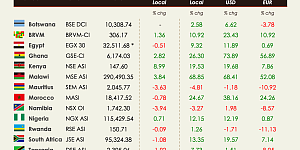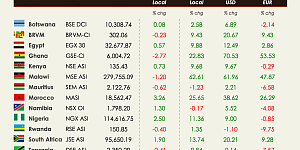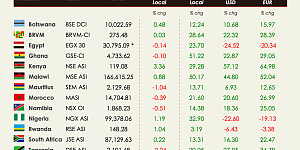It may seems as if this edition is focused on Nigeria, and you are right, a lot of movement on the Nigerian stock market took place this week.
The NGSE ASI continued its decline this week loosing 2.42%. As the previous week, depreciated valuation in high-capped stocks in consumer goods, cement and the banking sector are to be blamed for the decline. In particular, the share price losses of United Bank for Africa, Unilever, Access Bank, Transcorp and GTBank were responsible for the drop observed on the first day of trading.
Nigeria reached a $5.1bn debt settlement with oil majors. The goal is to payback foreign oil companies for past operating costs. $5.1bn will be paid within five years interest-free. The Minister of State for Petroleum stated that the barrels of oil to pay for this would come from the incremental generation by the oil companies and not on the current 2.2 mn barrels daily production figure for the country. Nigeria could pay more than its share of costs from October to December this year to reduce the outstanding bill for 2016 to $1.5 billion, Kachikwu said. In other news, in a report published this week, Moody’s writes that despite key challenges posed by the dollar shortage in the country, Nigeria’s growth prospects over the next three years are attractive. This came as Nigerian inflation hit an 11-years record at 18.3%. Earlier in the week, the Nigerian Stock Exchange halted trading in the shares of Ikeja Hotels Plc due to the continued quarrel among the major shareholders of the company in order to protect other shareholders as the disagreement has negatively affected the company's governance structure. A boardroom crisis is affecting the company since 2015. A crisis which led to the removal of the chairman.
The NSE ASI was down 0.91%. Kenyan government introduced caps on commercial lending back in August as a way to cut credit costs. For the first time since then, the effects have been felt by one of the country’s biggest banks. Barclays Bank of Kenya reported a decrease in nine-month profit as it tripled loan-loss provisions and bad loans surged. The Bank set aside 3.14bn shillings for bad credit which is three times more than the year-earlier period.
The ZSE Ind. gained 2.55% on the back of firming heavy-caps. Especially worth mentioning are the seed producers which ended positively as one of the seed companies declared it had enough seed to meet the country’s needs as farmers around the nation set up for the next agricultural season.
Finally the EGX 30 pursued its joy ride this week, gaining 4.99%, as investors continued their shopping spree following last week’s news that Egypt gained IMF’s approval for a three-year, $12 billion bailout program. The main index touched its highest level since May 2008, yet it grew at a slower speed versus last week.



























































